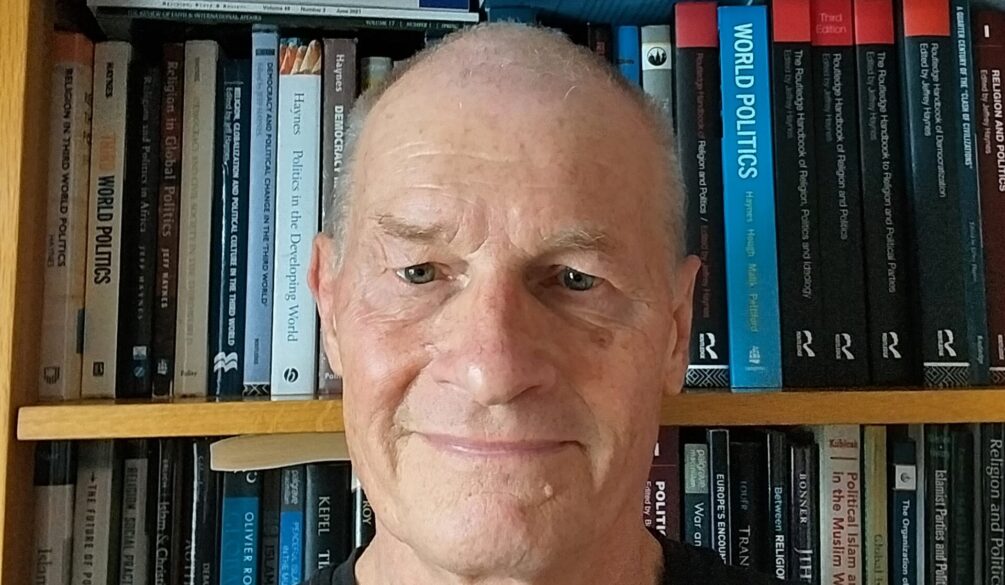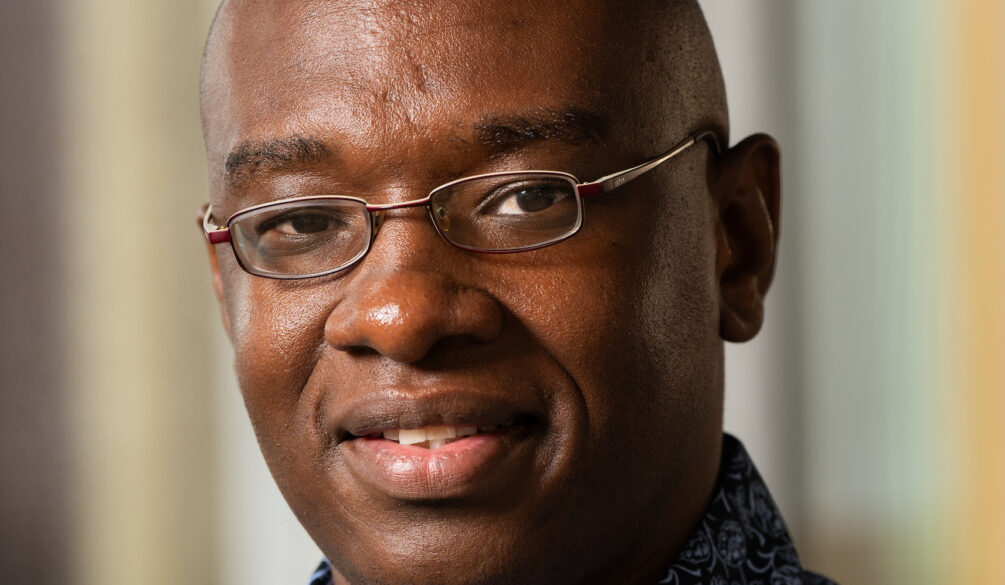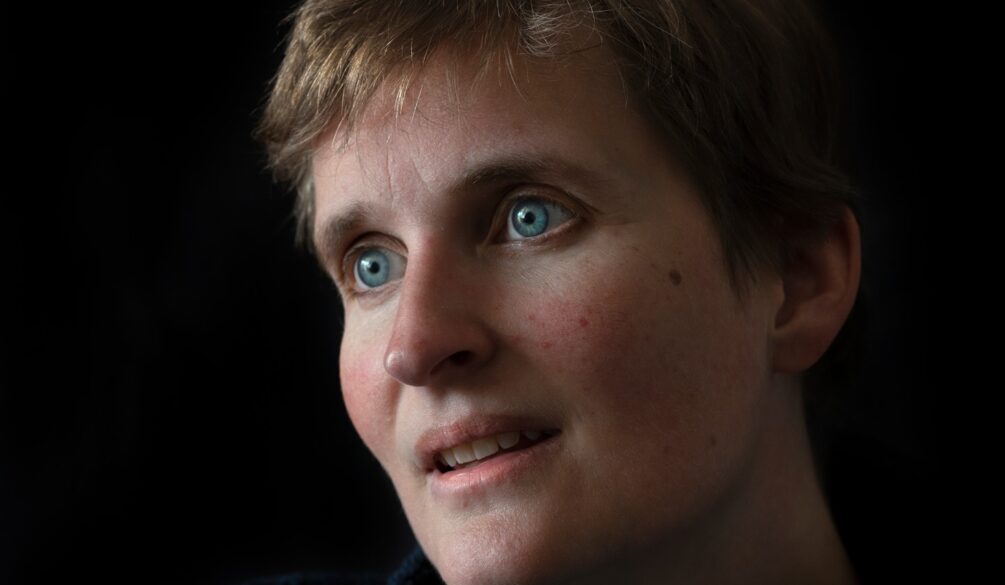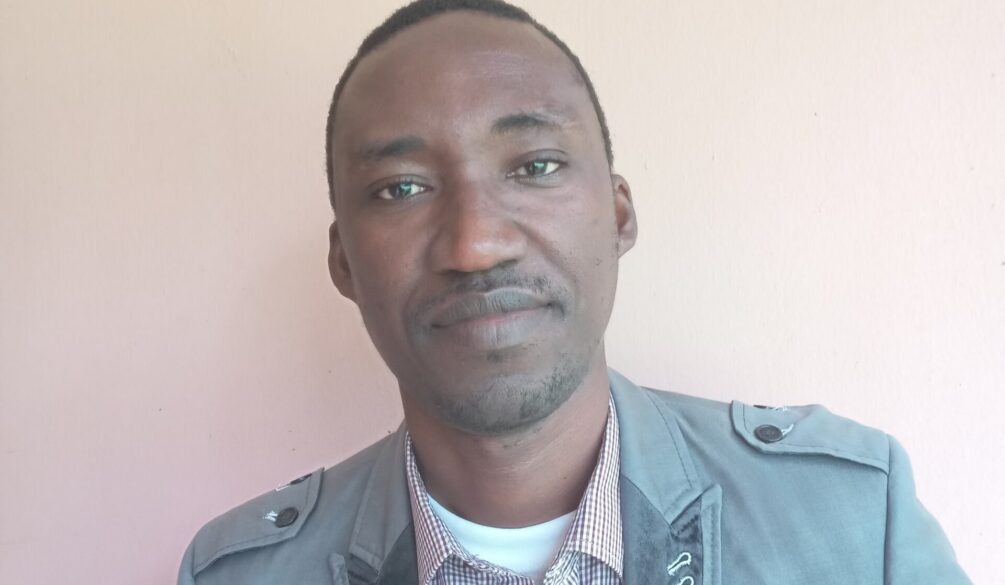2025
For our Researcher of the Month feature, we spoke with new AASR member Dr. Jeffrey Haynes about his long academic journey. Below is the conversation.
- Please tell us about your academic journey and the areas you focus on in your research.
Dr Jeffrey Haynes is emeritus professor of politics at London Metropolitan University, UK. His areas of expertise are religion and international relations, religion and politics, democracy and democratisation. He is co-editor-in-chief of Democratization, a Q1 comparative politics journal published eight times a year by Taylor & Francis and series editor of a book series for Routledge, Routledge Studies in Religion and Politics, which has published 54 books since the series began in 2011.Jeffrey Haynes is the author or editor of 65 books, most recently: The Routledge Handbook of Religion & Nationalism (ed.), Routledge, 2025; Christian Nationalism and Democracy in Ghana, Routledge, 2025; Religion & Politics: The Basics, Routledge, 2025; Ghana: 50 Years of Political Change, Digibooks, 2025; The Routledge Handbook of Politics and Religion in Contemporary America (ed.), Routledge, 2025; The Routledge Handbook of Religion and Politics (3rd ed.), Routledge, 2023; and Revolution and Democracy in Ghana: The Politics of Jerry John Rawlings, Routledge, 2023
- Tell us a little bit more about your recently published work.
After many years focusing on other topics, in 2022 I began researching into the issue of Christian nationalism and democracy in Ghana, a country about which I wrote my PhD many years ago, in 1988, with the title: [Jerry] Rawlings and the Politics of Development Policy in Ghana, 1979-86. My just-published research monograph, Christian Nationalism and Democracy in Ghana (Routledge, 2025) investigates the impact of Christian nationalism on democracy in Ghana, arguing that proponents of a specific Christian worldview seek to remake the country according to their values and beliefs.
Christian nationalism is a significant religious and political ideology in several African countries, not only Ghana, but also, among others, Zambia and Nigeria. In Ghana, prominent Christian nationalists, encouraged by sections of the American Christian Right, cultivate political influence with powerful political elites and by developing a high media profile to promote their views and increase their numbers of followers. The book examines specific examples of Christian nationalism’s impact on Ghana’s democracy: the national cathedral as a symbol of national unity and social cohesion, anti-Muslim pronouncements threatening inter-faith harmony, and attacks on Ghana’s LGBTQ+ community. Overall, the book argues that Christian nationalism is a specific threat to Ghana’s three decade-long liberal democracy, with the aim of undermining the constitutional equality and human rights of some Ghanaians in favour of a specific Christian worldview.
The main argument of the book is that in Ghana Christian nationalism has significant political influence, impacting on the country’s liberal democracy, human rights, and inter-faith relations. The objective of the book is to identify and examine Christian nationalism’s political and religious significance and assess its impact in one of Africa’s few consistent liberal democracies, a status Ghana has enjoyed for more than three decades, following the return to democracy in 1992 after a decade of undemocratic military-based rule.
- In what ways do you think your research addresses pressing societal challenges?
My current research addresses a pressing societal challenge, not only in Ghana, but more generally in sub-Saharan Africa, that is, how to co-exist in a religiously plural country buffeted by the ups and downs of globalisation.
Ghana is a religiously plural country, one of sub-Saharan Africa’s few liberal democracies. Ghana has been a liberal democracy since the early 1990s, following a decade of military-based rule. The current (1992) constitution, proclaims religious freedom in Ghana, with no religion officially favoured. There is considerable overlap between religious and other spheres of life in Ghana, and many religious actors are politically active.
Ghana is a Christian-majority country. The most recent census, in 2021, reported that 71.3% of Ghanaians are Christian. Muslims comprise 19.9% of the population, and followers of African Traditional Religions (ATRs) amount to just under 5%. Both Christianity and Islam have seen significant demographic growth in recent decades.
Many African countries have seen a strong advance of Pentecostal-Charismatic churches in recent decades. Although there is huge variety among these churches, what they have in common is the desire to be publicly influential. They seek to change the norms and values of their societies to fit more clearly into their religious framework. The key societal challenge they pose is: how can a diversity of views be accommodated in religiously plural countries in sub-Saharan Africa?
- How do you see your career/research develop and evolve in the near future?
I am emeritus professor, having retired slightly early in 2017. This freed me up to pursue research, to write and to publish. I am currently researching/writing a research monograph with the working title, Pentecostalisation, Politics and Development in Ghana, which will be completed a year from now, in June 2026. I am about to sign a contract for the book with a UK-based publisher in a suitable book series.
- From your wealth of experience, what advice would you give to your younger self?
Don’t give up. Set goals and stick to them. Don’t be put off by short term failure or obstacles. Regarding research, follow your heart not your head. That is, pursue research which interests you – not that which might win you hefty research grants but is not fulfilling.
- What role has the AASR played in your career growth?
I am a newcomer to AASR, turning to the study of religion and politics in sub-Saharan Africa after many years writing about politics and political development in Ghana, as well as religion and international relations, and democracy and development in the global south, including sub-Saharan Africa.
AASR is a focus of my research interests and I hope soon to publish in the AASR flagship journal,Utambuzi: Journal for the Study of the Religions of Africa and its Diaspora.
- Tell us the challenge(s) you encountered in your career and how you surmounted them. What lessons did you learn?
As I rose through the ranks at London Metropolitan University, from senior lecturer (associate professor) to reader (associate research professor) to full professor, I learned that managers may say they value research but at the same time they expect senior members of staff also to be managers, administrators, attend lots of committee meetings, teach – and write ‘ground-breaking’ research articles and monographs. I ended up as Dean for Research in a large faculty of around 200 people. I spent most of my time ‘managing’ colleagues – an interesting but fraught job – with many asking for more research time and less teaching! The biggest challenge for me was to maintain a ‘healthy’ research schedule and output while spending 80%+ plus of my time in management, attending committee meetings, administration and teaching.
Regarding lesson learned, I’ll repeat what I wrote for question 5: Don’t give up. Set goals and stick to them. Don’t be put off by short term failure or obstacles. Regarding research, follow your heart not your head. That is, pursue research which interests you – not that which might win you hefty research grants but is not fulfilling.
Recent photograph: attached.
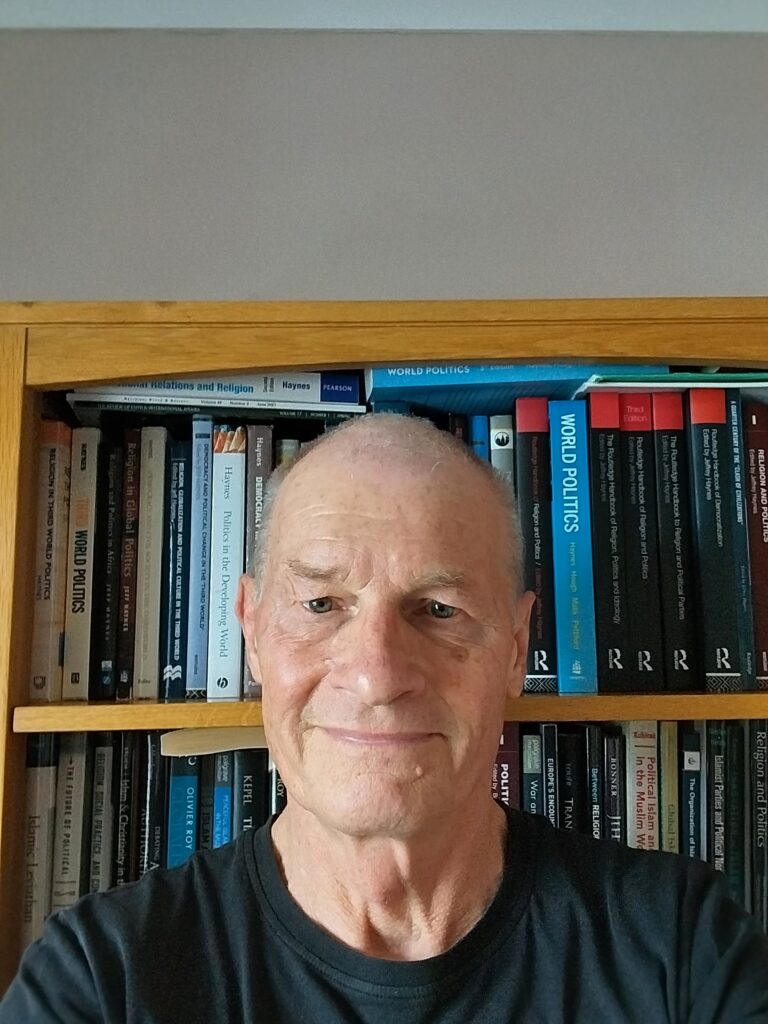
2025
Scholar of the Month
“AASR conferences were a welcome opportunity to connect with other researchers and keep in touch with the latest developments in scholarship.”
2024
Researcher of the Month
In this edition of AASR Researcher of the Month, the focus is on a mid-career scholar, Ibukunolu Isaac Olodude of the Obafemi Awolowo University, Nigeria. In this interview, he recounts the impact of the Association on his career trajectory.
Interviewer: Tell us about yourself; your academic background and your research interests.
I am Dr. Ibukunolu Isaac Olodude, a Researcher and Lecturer in the Department of Linguistics and African Languages, Obafemi Awolowo University, Ile-Ife, Nigeria. I hold a B.A. degree (2006) in Yoruba Language and Literature from Obafemi Awolowo University, Ile-Ife, Nigeria, where I graduated as the best male student in the Faculty of Arts. I also possess an MA (2012) and a PhD degree (2024) in Linguistics from the University of Ibadan, Nigeria. My doctoral research is multidisciplinary and intersects the fields of Linguistics, Religious Studies, Migration Studies, and Sociology. My areas of specialization are African Studies, Sociolinguistics, Applied Linguistics, Critical Discourse Analysis, and African Gender/Sexuality Studies, while my research interests are language, religion, and society; gender and identity studies; migration and environmental studies. I am a member of the West African Linguistic Society (WALS) and the African Association for the Study of Religions (AASR). I am also a Fellow of the Ife Institute of Advanced Studies (IIAS).
Interviewer: Could you give us insight into your current research project(s)?
My current research projects revolve around the ongoing debates about gender, sexuality, and diversity in African societies. They focus on the traditions and language of the Yoruba people of West Africa and explore whether the Yoruba do or allow for queerness. The research aims to advance these debates through cultural hermeneutics and linguistic analysis. One of the approaches is to examine what the understanding of queerness is, in the Yoruba indigenous religion. The research also examines how non-normative categories of gender and sexuality are articulated or silenced in the Yoruba oral literature (including the sacred Ifá literary corpus), as well as in the lexicon of the contemporary Yoruba language. The project also seeks to carry out critical discourse analysis of gendered discourses both in gendered proverbial expressions and in Yoruba movies.
Interviewer: In what ways do you think your research addresses pressing societal challenges?
Queer communities in Africa continue to face discrimination because of the narration that the concept of queerness is un-African with several national policies and legislation outlawing the concept. This research will therefore contribute significantly to gender and queer studies in Nigeria and Africa as a continent. Findings from the research will provoke a social movement towards language engineering to capture other forms of identities within queer groups which lack linguistic expressions in the Yoruba language. The research digs deep into the Yoruba language and literature, as well as Yoruba indigenous religion to spotlight how non-normative gender and sexualities are articulated or silenced. It will thus help both national and international governments and non-governmental organisations in understanding how the Yoruba language and literature capture culturally gendered expressions and queerness. The research findings will be of immense help to both national and international gender and human rights activists by providing more insights into gender and sexuality issues in Nigeria and Africa. Overall, my research has continued to bring to the fore the place of indigenous knowledge in solving global societal challenges and issues.
Interviewer: How do you see your career and research develop and evolve in the near future?
I became a member of the AASR through Professor Adriaan van Klinken of the University of Leeds, and since then, my research continues to align with his research interests, especially in the fields of African religions, ecologies, queer and gender studies. My career/research continues to develop along the longstanding vision and strategy of Prof. van Klinken, to promote and advance African queer and cultural studies, with a particular interest in religion and queerness in African contexts. I hope to continually establish research collaborations through my membership of the AASR that will see me through to the peak of my career and make me an outstanding scholar in African Studies.
Interviewer: From your wealth of experience, what advice would you give younger scholars?
My advice to younger and upcoming researchers and scholars is in two folds. First, the role of mentorship in career development cannot be over-emphasized. In the words of the famous English scientist, Sir Isaac Newton, “If I have seen further, it is by standing on the shoulder of giants”. My candid advice is that they must recognize the place of mentors in their career growth and development and they should leverage their mentors’ wisdom, expertise, and scholarship. And of course, a place to find such worthy mentors is an association such as the AASR where I found mine. Second, an African proverb says, and I quote, “if you want to go fast, go alone; if you want to go far, go together”. This proverb underscores the need for teamwork rather than being a lone ranger. Here, my advice to younger researchers is to avoid being fixated on one particular research area, rather they should get involved in interdisciplinary and multidisciplinary research that seeks to find solutions to societal challenges from multiple points of view.
Interviewer: What role has the AASR played in your career growth?
Since becoming an active member of the African Association for the Study of Religions (AASR), my academic career has continued to be refined and my research focus sharpened, especially following my participation in a British Academy-funded Writing Workshop convened by Professor van Klinken, at Nairobi Kenya in July 2023. I was also privileged to participate in the AASR conference which was held at the University of Nairobi in August 2023. At the conference, I presented a paper entitled “Kukurúùkúù: Ecospiritual Implications of the Sounds of the Cockcrow in Yoruba Rural Dwellings”. The paper has since been published in the Journal of the British Academy. I was also able to attend the2024 Conference jointly organised by Calvin University, Nagel Institute, and the African Association for the Study of Religions (AASR) with the theme ‘Engaging African Realities’ in Abuja, Nigeria. Through some connections made in the Association, I also participated in two academic conferences in the United Kingdom in August 2024: The African Studies Association (ASA-UK), and the British Association for the Study of Religions (BASR), respectively. At the ASA-UK conference, I presented a paper titled ‘Binary versus Queerness: Negotiating Gender and Sexuality Discourses in Yoruba Films and Expressions’, while at the BASR conference, I presented a paper on ‘In the City of 201 Gods: Religion, Identity Contestations and Construction among Muslim Ile-Ife Indigenes’. Membership of the AASR and the conference opportunities I have participated in have offered me scholarly platforms to present my research and get positive feedback.
Interviewer: Tell us the challenge(s) you encountered in your career and how you surmounted them. What lessons did you learn? Prior to my becoming a member of the AASR, the major challenge I encountered in my career was the absence of opportunities to present my research on a global stage. I had always desired to get a platform to connect with renowned scholars to receive mentorship and positive feedback on my research. Participation in international conferences and workshops undoubtedly requires funding which has also been a major challenge to me. However, to overcome these challenges, I was determined never to lower the standard of my research and to also keep pushing on until I eventually got in touch with some mentors through my membership in the AASR. Since then, I have been provided with global platforms, which I so much desire, for the presentation of my research.

